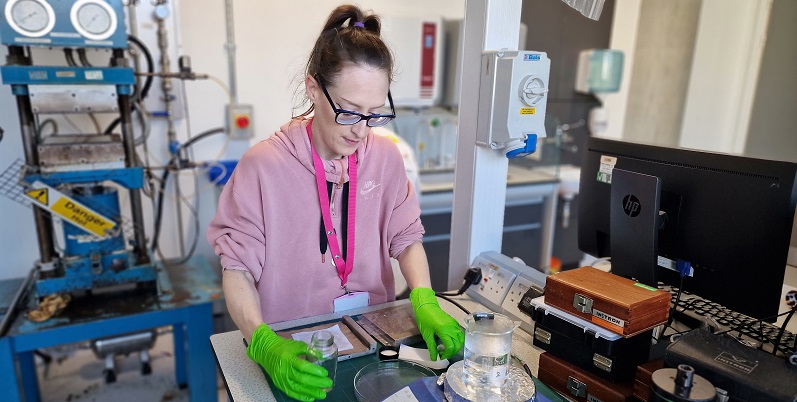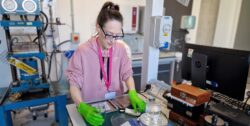Ashley talks sustainable labs and single use plastics

Last year I began my role as a Student Sustainability Architect, where I was tasked with exploring the use of single-use plastics (SUPs) in laboratories across campus. The key aim of this work was to understand what kind of items were being used and how we could support labs in reducing or eliminating their use.
We were keen to find a way for labs to audit their plastic use in the most efficient way and so I developed a form for lab users to complete to help provide some information the SUPs being used, and why they were the preferred option. This coincided with the SUP action plan developed by the Sustainability Service, where key plastic items could be identified and alternatives considered.
We received responses from labs in all faculties across campus with labs space which gave us some information to help us move forward, as well as encouraging insight into the efforts in reducing use of SUPs already being implemented. Even more encouraging was learning that over 50% of labs are recycling plastic bags, containers, and packaging!
Top 10 SUPs identified:
- Tissue culture flasks
- Syringe filters
- Pipette tips
- Multi-well plates/dishes
- Pasteur pipette
- Disposable gloves
- Weighing boats
- Petri dishes
- Vacuum filters
- Syringes
Reducing SUPs:
The ability to reuse plastic lab items would help to reduce the need to buy more. In some cases, despite being referred to as ‘single-use’, some plastic lab items are used more than once such as pipette tip boxes, weighing boats and some syringes for example. However, reusing is a major challenge for many labs when there is a risk of contamination, which nearly all respondents remarked on.
The nature of much research across scientific labs means that decontamination is required for reuse of items, mostly in the form of sterilization which is more thorough than simple disinfection. This is the case for most labs within the Faculties of Biological Sciences and Medicine and Health, for example, where lab work involves working with DNA, bacteria, etc. Although some plastic items can be sterilized via autoclaving for example, there are some areas of lab work where the risk of any kind of contamination could affect experimental reproducibility or pose a safety risk.
That isn’t to say it can’t be done, and one of the key barriers to this was the lack of resources and guidance to implement efficient sterilization procedures. This also highlighted an opportunity for the University to explore washing and reuse in research and publish studies that provide the knowledge on whether certain experiments would be affected through the wash and reuse of lab plastics.
Plastic alternatives
Another route to reducing SUPs is to consider glass alternatives, and historically, many items used in the lab were made of glass and over time, were replaced with plastic. There is a shift towards returning to glass, when possible, but the need for high accuracy and availability of feasible glass alternatives means plastic is typically favored over glass. Other alternatives such as paper weighing boats have been implemented across many labs as a feasible way to reduce plastics.
Although reducing or eliminating is the preferred course of action for SUPs, recycling used lab plastics is nonetheless an option to consider, and over 50% of respondents expressed an openness to washing their plastic lab items for recycling if they had the resources and knowledge to do so.
What are our next steps?
The results of this questionnaire gave us a lot to think about in terms of providing guidance to suit the many different labs across campus. With these insights we started to build a picture of the SUPs used in labs, and the challenges faced across different ones, and it was clear that resources and information made available to lab users would help them to overcome some of their barriers.
This led to the development of our Sustainable Labs Resource Hub which provides advice on a range of different areas beyond single-use plastics, including waste, water, energy and green chemistry. The hub has hints and tips related to reducing plastic, energy and water use, guides on decontamination, inductions, advice on pricing of alternative items that could be used, as well as much more.
Whilst it is still in development, we are currently running a small beta test among the sustainability community to gain some feedback on the content and will continue to make improvements and develop this as a one-stop shop for sustainable labs.
We’d love to get your feedback, so do visit the hub and see what you think!
Find out more about our continued efforts to remove, reduce and switch from single-use plastics across University operations – and ways you can get involved in this work.
Keep up to date on the latest news
-
-
- Follow us on Twitter: @UoL_Sus
- Follow us on Instagram: @uol_sus
- Follow us on Facebook: @UoLSustainability
- Sign up to our Sustainability newsletter
-
United Nations Sustainable Development Goals
 We use the United Nations Sustainable Development Goals (SDGs) as a framework to guide our activity. Our work on Student Citizenship links to all of the SDGs.
We use the United Nations Sustainable Development Goals (SDGs) as a framework to guide our activity. Our work on Student Citizenship links to all of the SDGs.
Find out more about our impact on the SDGs.
